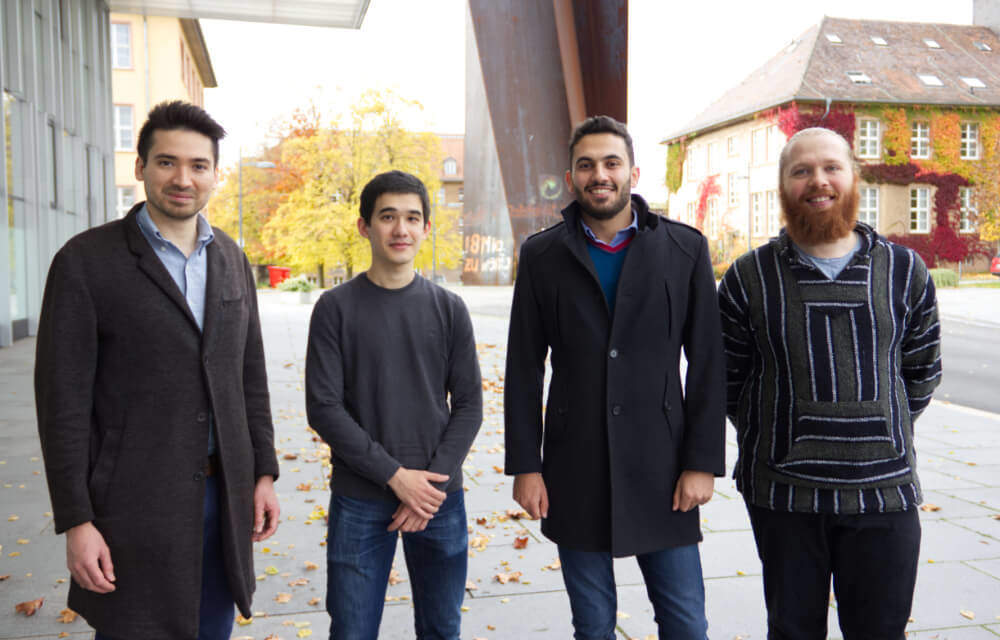By students for students: The new app of Saarland University

The app developers Anthony Heggen, Matias Klimpel Akahoshi, Ali Alhasani, Julien Schanz (left to right)
A team of international master students of computer science has developed a new university app. It has many functions that make life easier for students and university employees alike.
Computer science students at Saarland University have the chance to gain work experience already during their studies. As part of the course “Software Engineering” students develop a software for a real client. The working conditions are realistic: “We have to discuss with the clients and work out ourselves how we can implement their wishes”, says master student Ali Alhasani, the iOS developer for the new university app. The client of his group was computer science professor Andreas Zeller, who was also responsible for developing the previous version of the app.
“The previous app was already quite old and therefore didn’t work properly anymore. It also no longer met Apple’s current design guidelines,” explains Alhasani. During his bachelor’s studies in Palestine Ali Alhasani had already worked as a freelance software developer for Apple devices: “It was clear to me that I could make a meaningful contribution in this project. I also found it exciting to design something that would be useful for all students at the university,” says the 25-year-old. Together with his fellow students Matias Klimpel Akahoshi, Anthony Heggen, Julien Schanz and Serdar Durdyyev, he formed a development team.
“In the beginning, we spent a lot of time on the conception and planning of features. We looked at numerous apps from other universities, including international top universities. Then, we incorporated the best ideas into our app,” says Alhasani. The students designed their app from scratch. And work like this is what makes a team. “During the development of the app we became really good friends, so I wouldn’t want to miss the experience. Even outside of work we spent a lot of time together, playing volleyball or going out for dinner”, says Ali Alhasani.
But what does the new app offer? Users can read university news, check what’s on offer in the cafeteria or look up public transport. In addition, they can now filter dishes in the cafeteria for allergens, use an interactive map of the campus or look up contact details in the university’s personal register. Various accessibility features such as a read-aloud function for the blind, changeable font sizes for the visually impaired or a mode for color blind people are now also integrated. “In addition, the app is now available in German, English and French. This helps the international students”, adds Alhasani.
An Android version of the app is also almost finished. The team is now looking for volunteers to complete the development. They have published the app’s source code online under an open source license so that others can continue to develop and improve the software.
Background Saarland Informatics Campus:
800 scientists and about 2000 students from more than 80 nations make the Saarland Informatics Campus (SIC) one of the leading locations for computer science in Germany and Europe. Five world-renowned research institutes, namely the German Research Center for Artificial Intelligence (DFKI), the Max Planck Institute for Computer Science, the Max Planck Institute for Software Systems, the Center for Bioinformatics and the Cluster for “Multimodal Computing and Interaction” as well as Saarland University with three departments and 21 degree programs cover the entire spectrum of computer science.
Editor:
Philipp Zapf-Schramm
Competence Center Computer Science
Saarland Informatics Campus
Phone: +49 681 302-70741
E-Mail: pzapf@mmci.uni-saarland.de
Die Öffentlichkeitsarbeit am Saarland Informatics Campus wird unterstützt durch das Kompetenzzentrum Informatik Saarland, gefördert aus Mitteln des Europäischen Fonds für regionale Entwicklung (EFRE) und Mitteln der Staatskanzlei Saarland.


